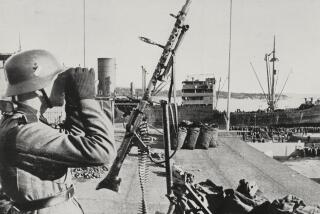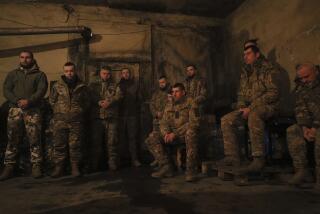U.S. is facing a war unlike all others
At the beginning of the 1970 movie “Patton,” George C. Scott’s title character stands in front of an American flag backdrop and speaks of war.
“No bastard ever won a war by dying for his country,” Patton says with characteristic bluntness as he turns the cliche on its head. “You win a war by making the other poor bastard die for his country.”
Americans eager for a Patton to take this country to victory in the war against terrorism should realize that this is going to be a different kind of fight.
Consider that all the enemy fighters positively identified in this new war have already died, deliberately. Yet we haven’t declared victory. The rules don’t apply anymore. We don’t know if we are fighting an army of 100, 1,000 or 1 million. We don’t know where they are, how they are armed, the location of their supply routes.
This war will probably not provide the emotional catharsis of seeing our troops raising the American flag -- Iwo Jima-like -- above conquered territory.
Even Secretary of Defense Donald H. Rumsfeld admits he is not sure how to define what’s coming. “What we’re engaged in is something very, very different from World War II, Korea, Vietnam, the gulf war, Kosovo, or Bosnia, the kinds of things people think of when we use the word ‘war,’ ‘campaign’ or ‘conflict.’ We really are going to have to fashion a new vocabulary and a different construct for thinking about what it is we’re doing,” he said in a news conference last week.
“I think the word ‘war’ applied to this situation is troublesome,” says John Steinbruner, director of the Center for International and Security Studies at the University of Maryland, College Park. “The images it conveys are probably all wrong for this situation. Clearly we have to try to contain this threat, but the magnitude and character of it are very uncertain. What will happen is outside the bounds of our previous experience. But we really don’t know where the new boundaries are.”
Steven David, a political scientist at the Johns Hopkins University, has a different view of the terminology. “This is war,” he says. “This is not something from the criminal justice system where we find Osama bin Laden and read him his Miranda rights.”
Frederick Starr of Hopkins’ School of Advanced International Studies (SAIS) agrees. “War is not just a metaphor, it is the appropriate response to these heinous deeds. Anything less would be shameful. That means knocking out and destroying all those immediately responsible for what has happened.”
American troops marching through the Khyber Pass headed for the Hindu Kush in search of bin Laden and his followers might provide Patton-like pictures, but the prospects for success are probably little greater than those of the previous military powers that tried such an invasion -- the British in the 19th century and the Soviets 20 years ago.
“Hasty military action in Afghanistan would, I think, run a risk,” says John Lampe, chair of the department of history at UMCP. “If the risk is justified by really hitting bin Laden himself and other active terrorist groups, then it probably is a justified risk. But it should be recognized as a huge risk.”
Bombing the country back to the Stone Age to teach it a lesson about the cost of harboring terrorists also has limited appeal because the Russians and the current Taliban government have basically returned Afghanistan to the Stone Age already. There is a dim prospect of bombs actually finding bin Laden, of doing anything beyond raining terror on an already brutalized population.
Starr of SAIS thinks the focus on Afghanistan is misplaced.
“What is striking about the 19 hijackers is not a single one is Afghani,” he says. “What we do know is that the hijackers and their supporters are overwhelmingly from the Arab world, overwhelmingly from states with which we have cordial relations -- Egypt, Saudi Arabia, the gulf states.”
He points out the reason those Arabs are in Afghanistan is that the United State brought them there two decades ago to fight the Soviets. “We called them freedom fighters,” he says.
The first battles of this war are likely to be fought on the diplomatic front.
“First, we need information and, therefore, international collaboration much broader than our normal alliance system,” says Steinbruner. “We have to have Russia, China and India, at a minimum, involved, or our coalition is too narrow.”
Steinbruner says the problem is that this would require the exchange of “intimate” information with nations perceived as hostile.
“If we try to wage this war without these other countries, we will be in trouble,” he says, cautioning that unless the United States has proper intelligence, it runs the risk of taking action that hurts the fight against terrorism.
“The grave danger is that we do not eradicate the threat, but stimulate it by doing larger damage and getting ourselves painted as terrorists,” he says.
Lampe agrees: “We have to be careful of any kind of indiscriminate or ill-timed effort. If we mobilize the Islamic world against us, more regimes would start harboring terrorists.”
There may well be some sort of spectacular military action -- this war’s equivalent of the Doolittle raid on Tokyo that raised American morale after the attack on Pearl Harbor -- followed by a long and quieter struggle. “The public will be looking for some kind of military action in the next weeks or months,” says Lampe. “That has to be chosen very carefully, maybe even explained to the public why it is being delayed.”
But in the long term, this war will probably consist of small battles, fought at close range, a war of counterinsurgency aimed at disrupting and destroying the networks that run the terrorist operations. “It will be the covert kind of war the way the Israelis were doing it,” says Francis Fukuyama of SAIS. “You find one of these guys and he shows up dead after talking into an exploding cell phone.”
Fukuyama thinks this is a winnable war, pointing to the collapse of the Shining Path in Peru when its leadership was disrupted. “It’s possible to do this without stirring up a hornet’s nest.”
Still, there are few examples of military victories over terrorist groups. Steinbruner says the French managed to break the back of the terrorists in Algeria, but used such brutality that the population turned against their rule.
James Ron, a sociologist at McGill University in Montreal, says this is the usual reaction. “Investigation, interrogation, torture, it does work in the short term in terms of helping you roll up whatever network you are trying to crush,” he says. “But in the long term, it causes more resentment.”
Ron, an Israeli, says, “People use violence for complicated reasons. Maybe we should explore what their grievances might be.”
But David, the political scientist at Hopkins, sees danger in setting a precedent of terrorist attacks in any way achieving their goals, which he says in this case are unachievable anyway. “What Osama bin Laden hates about America is the fact that we are Americans, that our values are Western,” he says. “People like him and of his ilk cannot stand the fact that America stands strong in the world, that it’s our influence, not his perverted view of religion’s influence, that is so dominant.”
It could be that this time the terrorists have overstepped, making too many people mad at them, as the Red Brigade in Italy did when it murdered former Prime Minister Aldo Moro in 1978, the critical step toward ending support for that terrorist group.
“The terrorists may have succeeded too well,” says David. “The Pearl Harbor analogy does fit in this case. The Japanese attacked us hoping it would keep us out of the war in Asia, but they produced exactly the opposite reaction. They woke up a sleeping giant. I hope it’s the same in this situation.”
More to Read
Start your day right
Sign up for Essential California for news, features and recommendations from the L.A. Times and beyond in your inbox six days a week.
You may occasionally receive promotional content from the Los Angeles Times.






